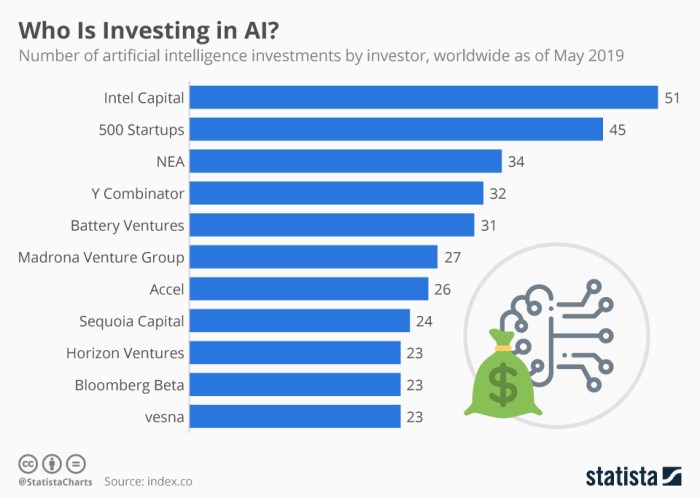
AI investment opportunities open doors to a world of potential growth and innovation, where cutting-edge technologies intersect with promising financial prospects. In this narrative, we delve into the realm of AI investments, uncovering key sectors, emerging trends, and factors influencing decision-making to provide a comprehensive guide for investors seeking to capitalize on this dynamic landscape.
Overview of AI Investment Opportunities
Investing in AI opportunities involves funding projects, companies, or technologies that utilize artificial intelligence to enhance processes, improve efficiencies, and drive innovation across various industries. These investments can offer significant returns and play a crucial role in shaping the future of technology and business.
Key Sectors for AI Investment Opportunities
AI investment opportunities are prevalent in sectors such as healthcare, finance, e-commerce, autonomous vehicles, cybersecurity, and manufacturing. These industries benefit greatly from AI applications, making them attractive options for investors seeking high-growth potential.
- Healthcare: AI is revolutionizing patient care, diagnostics, and drug discovery, presenting numerous investment opportunities in the sector.
- Finance: AI-driven solutions are being used for fraud detection, risk assessment, trading algorithms, and personalized banking services, attracting investors looking to capitalize on financial technology innovations.
- E-commerce: AI-powered tools for customer analytics, recommendation systems, supply chain optimization, and chatbots are driving growth in the e-commerce sector, creating investment prospects.
- Autonomous Vehicles: The development of self-driving cars and related technologies powered by AI is a promising area for investment, with the potential to transform transportation systems.
- Cybersecurity: AI is being leveraged for threat detection, anomaly detection, and security automation, presenting investment opportunities in the cybersecurity space.
- Manufacturing: AI applications in predictive maintenance, quality control, supply chain management, and robotic automation are driving efficiency gains in the manufacturing sector, making it an attractive investment option.
Successful AI Investments in Recent Years
In recent years, several AI investments have yielded significant returns for investors. Companies like DeepMind Technologies (acquired by Google), UiPath, C3.ai, and DataRobot have attracted substantial funding and achieved successful exits through acquisitions or IPOs. These success stories highlight the potential for lucrative returns in the AI investment landscape.
Emerging Trends in AI Investment

AI investment trends are constantly evolving, reflecting the rapid advancements in technology and the increasing adoption of AI across various industries. Investors are looking towards AI-driven opportunities as a way to capitalize on the potential growth and innovation in this sector.
Over time, AI investment trends have shifted from a focus on basic automation and efficiency to more complex applications such as machine learning, natural language processing, and computer vision. This evolution has opened up new possibilities for investors to explore and invest in cutting-edge technologies that have the potential to disrupt traditional industries.
Comparison of Traditional vs. AI-driven Investments
- Traditional investments often rely on historical data, market trends, and human analysis to make decisions, whereas AI-driven investments leverage algorithms and machine learning models to analyze massive amounts of data and identify patterns.
- AI-driven investments can provide more accurate predictions and insights, reducing the risk of human error and bias that may affect traditional investment strategies.
- AI-driven investments also offer the potential for higher returns and faster decision-making processes, as AI algorithms can quickly process and analyze data to identify investment opportunities in real-time.
- However, AI-driven investments may also pose challenges such as algorithmic bias, data privacy concerns, and the need for continuous monitoring and updates to ensure the accuracy and reliability of AI models.
Factors Influencing AI Investment Decisions
Investing in AI opportunities involves careful evaluation of various factors that can impact the success of the investment. From market conditions to regulatory frameworks, there are several key considerations that investors need to take into account.
Market Conditions Impact
Market conditions play a crucial role in influencing AI investment decisions. Factors such as overall economic stability, industry trends, and consumer demand can significantly impact the success of AI investments. For example, during periods of economic uncertainty, investors may be more cautious about allocating funds to AI projects due to the higher level of risk involved.
On the other hand, a booming market with high demand for AI technologies may attract more investment opportunities.
- Overall economic stability
- Industry trends
- Consumer demand
Regulatory Frameworks Impact
Regulatory frameworks also play a critical role in shaping AI investment strategies. Investors need to consider the legal and ethical implications of investing in AI technologies, as well as compliance with data protection and privacy laws. For example, stricter regulations around data privacy can impact the development and deployment of AI solutions, ultimately influencing investment decisions.
- Legal and ethical implications
- Data protection and privacy laws
- Compliance requirements
Risk Management in AI Investments
When it comes to investing in AI, managing risks is crucial to ensure the success of your investment portfolio. By implementing effective strategies, you can minimize potential losses and maximize returns in this rapidly evolving field.
Strategies for Managing Risks in AI Investments
- Diversification: One key strategy is to diversify your AI investment portfolio across different sectors and technologies. This helps spread out risks and reduces the impact of any single investment underperforming.
- Thorough Research: Conduct in-depth research on AI companies and technologies before investing. Understanding the market trends, competition, and potential risks associated with each investment can help you make informed decisions.
- Stay Informed: Keep yourself updated with the latest developments in AI and the tech industry as a whole. This will help you anticipate potential risks and adjust your investment strategy accordingly.
- Risk Assessment: Regularly assess the risks in your AI investment portfolio and make adjustments as needed. Stay vigilant and proactive in managing potential threats to your investments.
Common Risks in AI Investment Portfolios
- Technological Risks: Rapid advancements in AI technology can make investments obsolete or less competitive. It’s essential to stay ahead of the curve and invest in companies with sustainable technologies.
- Regulatory Risks: Changes in regulations and laws surrounding AI can impact your investments. Stay informed about legal developments and ensure compliance to mitigate regulatory risks.
- Market Volatility: The volatile nature of the tech industry can lead to sudden fluctuations in AI stock prices. Diversification and risk assessment can help manage the impact of market volatility on your investments.
Importance of Diversification in AI Investment Strategies
Diversification is a fundamental risk management strategy in AI investments. By spreading your investments across different companies, sectors, and technologies, you reduce the impact of any single investment failing or underperforming. This ensures a more stable and resilient investment portfolio that can withstand market fluctuations and uncertainties in the AI industry.
Ending Remarks
As we conclude our exploration of AI investment opportunities, it becomes evident that embracing the potential of artificial intelligence can lead to lucrative returns and strategic advantages in the ever-evolving investment landscape. By staying informed, adapting to emerging trends, and effectively managing risks, investors can position themselves for success in this exciting domain.
Common Queries
What are the key sectors where AI investment opportunities are prominent?
Key sectors include healthcare, finance, retail, and cybersecurity, among others, where AI technologies are revolutionizing operations and driving growth.
How do market conditions impact decision-making in AI investments?
Market conditions such as economic trends, competition, and consumer demand play a crucial role in influencing investment decisions in the realm of AI.
Why is diversification important in AI investment strategies?
Diversification helps mitigate risks by spreading investments across different assets, reducing the impact of potential losses in any single investment.














